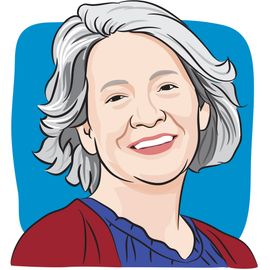- About Us
- Advertise / Support
- Editorial Board
- Contact Us
- CancerNetwork.com
- TargetedOnc.com
- OncLive.com
- OncNursingNews.com
- Terms & Conditions
- Privacy
- Do Not Sell My Information
- Washington My Health My Data
© 2025 MJH Life Sciences™ and CURE - Oncology & Cancer News for Patients & Caregivers. All rights reserved.
When Cancer Hits Close to Home

Doris Cardwell received a life-changing diagnosis of inflammatory breast cancer in 2007. While undergoing treatment, she co-founded a mentor program for the cancer center treating her. She also created community events to educate, encourage and empower people regarding cancer. Doris was the first Survivorship Community Outreach Liaison for her local cancer center. She is an advocate, educator and encourager on issues facing cancer survivors. Doris is a wife, mother, empty nester, survivor of life and lover of all things coffee. An avid speaker and blogger, she is available at www.justdoris.com.
A cancer survivor describes how hearing about a friend’s cancer diagnosis brings emotions to the surface.
Everyone's cancer journey is different and challenging. As a survivor I realize some times are more difficult than others. When my first friend I met during treatment passed away, I felt many emotions, none of them easy. As our adult daughters began screening for breast cancer, my emotions went wild. One day I saw a spot on my husband’s ear and I Googled for days trying to figure out what it might be. Turns out it was only a scratch from his latest work project.
Recently a family that I care about lost a husband and father to cancer. He was sick for two months. I could not go see him. I wanted to, but it hit me too close to home. His wife is my co-worker and friend, someone I am used to seeing every day. The grief that I have felt is deep and painful, but it also feels like old grief mixed in with new. It feels powerful and confusing, like a Mack truck spinning in a circle while going down the highway.
Recently I was pondering why I couldn't find words for what I felt. I wondered why I had been so incredibly angry for the two months he was sick. I wondered why my heart was so heavy. I found myself walking around sighing deeply all the time. A couple people said to me early on in his illness, that is a lot for you to walk through this close. I thought to myself, “Seriously, don’t be silly, I am not the one who is sick or caregiving.”
I have heard ignorance can be bliss, but the reality is that is not always true. I was ignorant to how much of my own cancer journey was still locked away deep inside me. When I was diagnosed, our daughters were 10, 12 and 17. One hundred percent of my focus went to them not seeing me as sick and dying. I refused to be around people who seemed sure I would die. One person even called me one day and said, "I thought you'd be dead by now, but I heard you are doing good!" I hung up the phone, blown away by yet another unbelievable comment.
Fourteen years later, I am still here. I am finally aware of the truckload of emotion that started the day I heard, “You have cancer.” I went into full survival mode, which meant there was no time to feel anything. Processing those emotions is something I have worked through little by little. It feels almost selfish that I am still unpacking stuff, while my friend is wading in deep waters of her own.
Grief and cancer often go hand in hand. Whether it is the loss of a loved one or the loss of your normal, both bring their own set of challenges. My faith allowed me to function and even thrive when I was going through treatment and beyond. My friend’s faith allowed her to function while caring for her beloved spouse. It will carry her beyond to thriving again one day.
If you are struggling with powerful emotions in your own or a loved one’s cancer journey, know it is normal. If watching someone else's struggle evokes more than your own did, that is okay too. We all process on our own time schedule, but we need to do it in a healthy way. That can look different for each of us. Reading about grief, sadness and PTSD can be helpful. Finding support either online or in-person can be productive. Just realizing you are not alone or abnormal in your feelings can help in the healing process. Life is hard and we were not created to deal with it alone.
For more news on cancer updates, research and education, don’t forget to subscribe to CURE®’s newsletters here.
Related Content:



